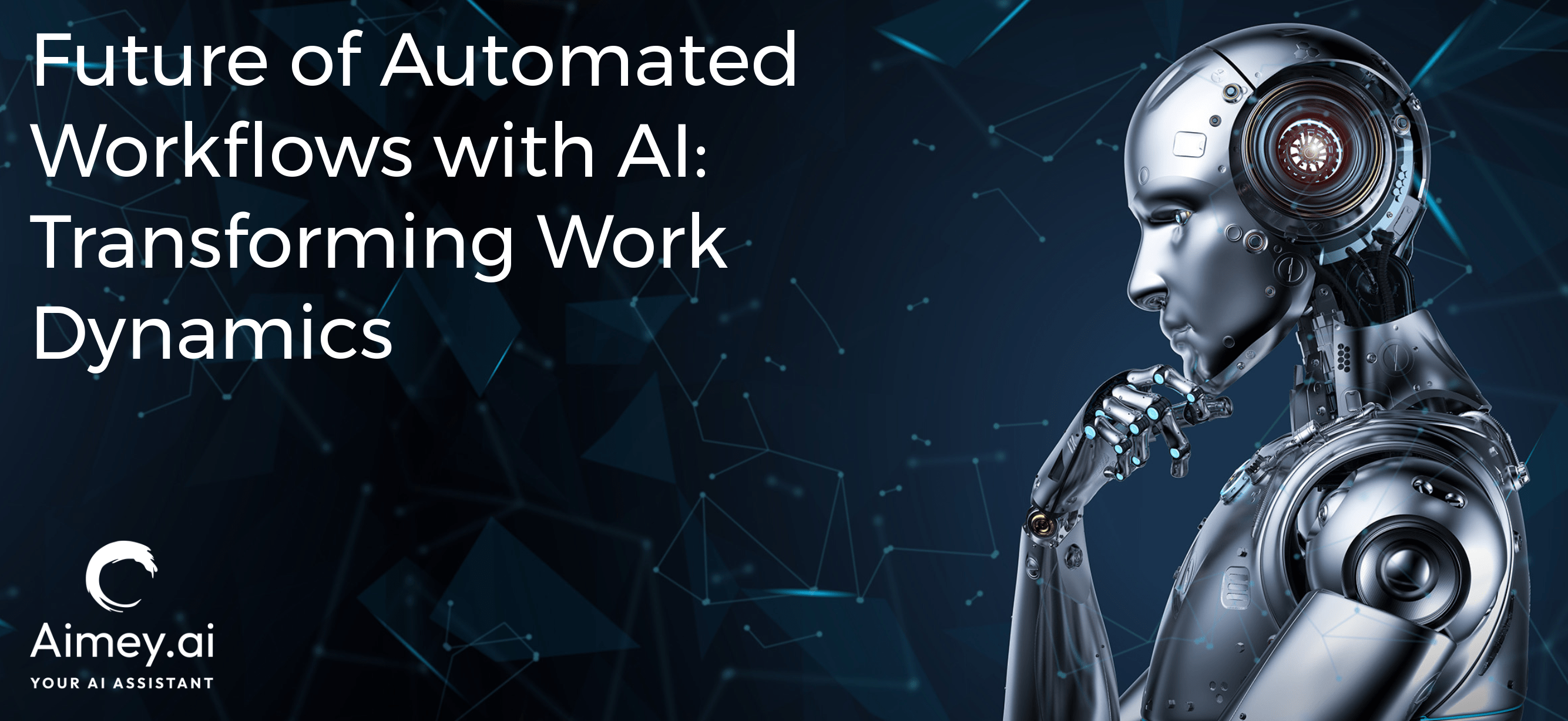The Emergence of AI in the Modern Workplace
The future of automated workflows with AI is already here, signaling a transformative shift in how we approach everyday tasks in the workplace. Artificial intelligence (AI) has rapidly evolved from a niche technology to an integral part of modern business operations. From predictive analytics to natural language processing, AI technologies are providing unprecedented opportunities for enhancing productivity and efficiency.
AI’s emergence into the workplace is not just a trend; it is a revolution that reshapes the landscape of work itself. By leveraging advanced algorithms and machine learning techniques, AI systems can now perform complex tasks that previously required human intervention. This transition to AI-powered tasks, from data entry to customer relationship management, allows us to focus on more strategic, creative, and high-level activities.
Importance of Automated Workflows
The significance of automation in our workflows cannot be overstated. Automated workflows streamline processes, reduce errors, and save valuable time. By automating repetitive and mundane tasks, businesses can ensure that their human resources are being optimally utilized. More importantly, automation provides consistency in executing tasks, which is crucial for maintaining quality and reliability in outputs.
Furthermore, automated workflows enable real-time monitoring and management of tasks, which improves operational transparency and control. Companies can quickly adapt to changes, rectify issues, and optimize their processes to deliver better outcomes. As organizations scale, maintaining manual workflows becomes increasingly challenging and inefficient, making automation an essential component of modern business operations.
AI and Automation: A Revolutionary Future
As we stand on the cusp of a digital transition, the union of AI and automation signals a revolutionary future for our workflows. This convergence is not merely enhancing traditional automation; it is creating a sophisticated, intuitive, and dynamic system that can adapt and learn over time. The Future of Automated Workflows with AI is bright and boundless, as AI continues to unlock new dimensions of efficiency and innovation.
AI-driven automation systems can now predict workflow bottlenecks, suggest optimal paths, and even automate decision-making processes. These intelligent systems understand context, adapt to changing conditions, and continually improve based on feedback, making them indispensable tools for businesses aiming to thrive in a competitive landscape.
As we delve deeper into the capabilities of AI, it becomes evident that we are only scratching the surface of what’s possible. The synergy between AI and automation will not just transform individual businesses but will redefine entire industries, setting new standards for productivity, innovation, and growth.
AI Enhances Workflow Automation
Artificial intelligence is fundamentally transforming traditional workflow automation, providing a more dynamic and intuitive system that aligns with the rapid pace of modern business. Enhanced by machine learning algorithms, AI-driven platforms analyze data in real-time, offering tailored solutions to optimize processes. This adaptability ensures that our systems can continuously evolve, addressing inefficiencies promptly. Moreover, AI facilitates the creation of workflows that self-improve, reducing the need for constant human intervention. Thus, businesses can focus more on strategic activities rather than mundane, repetitive tasks.
Transforming the Business Landscape
There are numerous industries where the future of automated workflows with AI is already making a significant impact:
- Healthcare: Automated workflows in healthcare powered by AI can streamline patient record management, optimize appointment scheduling, and enhance diagnostic accuracy. For instance, AI algorithms can quickly analyze medical images, assisting radiologists in identifying abnormalities.
- Finance: In the finance sector, AI-driven automation helps to detect fraudulent transactions, manage risk, and streamline customer service through chatbots and other AI tools. By analyzing transaction data, AI can identify patterns indicative of fraud much faster than traditional methods.
- Manufacturing: AI enhances supply chain management by predicting demand, optimizing inventory levels, and managing logistics more efficiently. Robots equipped with AI can also adapt to changes in production requirements, thus enhancing manufacturing agility.
- Customer Service: AI-driven chatbots and virtual assistants can handle customer inquiries around the clock, offering immediate responses and personalized service. These systems can learn from each interaction, continually improving their service quality and reducing the workload on human agents.
Navigating Potential Challenges
Despite its potential, the integration of AI into workflow automation is not without challenges. One primary concern is data security. As we increasingly rely on AI to handle sensitive information, the risk of data breaches escalates. Therefore, robust encryption and cybersecurity measures become imperative. Another challenge lies in the initial cost and complexity of implementing AI systems. Small to medium-sized businesses might find these barriers significant. Hence, scalable and cost-effective AI solutions are essential for wider adoption.
Additionally, the workforce needs to adapt to this transition. Training and upskilling employees to work alongside AI tools will be crucial in ensuring a smooth integration. Overcoming resistance to change is another significant hurdle. Employees might fear job displacement; transparent communication about how AI can enhance their roles rather than replace them will be vital.
Did you know? AI-driven automation can boost productivity by up to 40% by taking over routine tasks, allowing humans to focus on creative and strategic responsibilities.
The Impact on the Future of Work
The “Future of automated workflows with AI” is set to revolutionize the very fabric of our work environment. As AI continues to permeate more aspects of our workflows, we can expect a substantial shift in the nature of work itself. AI can handle repetitive and mundane tasks with unprecedented efficiency, allowing us to focus on more strategic and creative endeavors. This transition will greatly benefit employers, employees, and entrepreneurs alike, offering an opportunity to reimagine job roles, enhance productivity, and stimulate innovation.
Preparing for an AI-Driven Future
As we move into an era where AI will dominate the workplace, it is crucial for us to be well-prepared. For businesses, embracing AI technology is not just a strategic advantage but a necessary step to stay competitive. Training and upskilling the workforce to work alongside AI systems is vital. For individuals, continuing education and adaptability will be key. Understanding how to leverage AI tools will open new doors, making us more valuable in the job market.
At aimey.ai, we are dedicated to guiding you through this transformative journey, providing the tools and knowledge you need to harness the full power of AI. By being proactive and open to change, we can seamlessly transition into this new era.
Creating Boundless Opportunities with AI
The potential of AI to create and enhance opportunities in the global market is limitless. With AI-driven automated workflows, new business models will emerge, industries will transform, and innovation will soar. Opportunities previously hindered by manual processes and inefficiencies will now be within reach. The “Future of automated workflows with AI” promises a landscape where the impossible becomes possible, driving progress and growth across sectors.
By embracing AI, we are not just improving our current workflows but also laying the foundation for future advancements. The world is on the cusp of an AI-driven evolution, and the steps we take today will define our success in this dynamic new world. Let’s seize the moment, embracing the innovations of AI to foster a future rich with possibilities and advancements.
FAQ
How is AI reshaping the modern workplace and enhancing workflow automation?
As we navigate the transformation of the workplace, AI is at the forefront of innovation, enabling us to design more intelligent and adaptive workflows. By integrating AI into our systems, we are witnessing a significant boost in efficiency and productivity. These enhancements come from AI’s ability to learn, predict, and automate complex tasks, allowing us to focus our efforts on areas that require human creativity and strategic thinking. As a result, the automation of workflows is no longer just about following predefined rules but also about evolving and improving processes over time.
What sectors are currently most impacted by the rise of AI-driven workflow automation?
In the current digital era, several sectors are experiencing a substantial transformation thanks to AI-driven workflow automation. Industries such as healthcare, finance, manufacturing, and customer service are reaping extensive benefits from AI integration. AI streamlines data analysis, expedites decision-making, and offers personalized customer experiences, revolutionizing traditional business operations. Moreover, it paves the way for innovating solutions that can address complex industry-specific challenges, ultimately setting a new standard for efficiency and effectiveness in the marketplace.
What challenges might be encountered when integrating AI into existing workflows, and how can they be addressed?
While the integration of AI into workflows promises great rewards, it also presents unique challenges. Key concerns include data privacy, job displacement, and the steep learning curve associated with new technologies. To navigate these challenges, it is imperative that we adopt a proactive approach by establishing clear data governance policies, fostering a culture of continuous learning and adaptation, and developing strategies for workforce re-skilling. By addressing these challenges head-on, we position ourselves to fully harness the power of AI and secure a competitive advantage in our respective fields.
How should individuals and businesses prepare for the increased prevalence of AI in the workplace?
To adeptly prepare for the rising dominance of AI in the workplace, both individuals and businesses must embrace a culture of lifelong learning. For businesses, it’s essential to invest in training programs to upskill employees, enabling them to work effectively alongside AI systems. Individuals should focus on enhancing their proficiency with AI tools and understanding the principles behind AI technology. Adaptability, technological literacy, and a forward-thinking mindset are crucial traits that will serve as key differentiators in an AI-driven future.
What kinds of new opportunities might AI-driven automated workflows create in the global market?
AI-driven automated workflows are unlocking a myriad of opportunities in the global market, from the emergence of new business models to enhancing existing operations across diverse industries. The agility and precision that AI brings to workflows mean that businesses can innovate more rapidly, offering bespoke solutions to consumers and tackling previously insurmountable challenges. Additionally, as AI continues to advance, new job roles centered around AI management and development are emerging, demonstrating the ever-evolving landscape of career possibilities forged through technological advancement.

